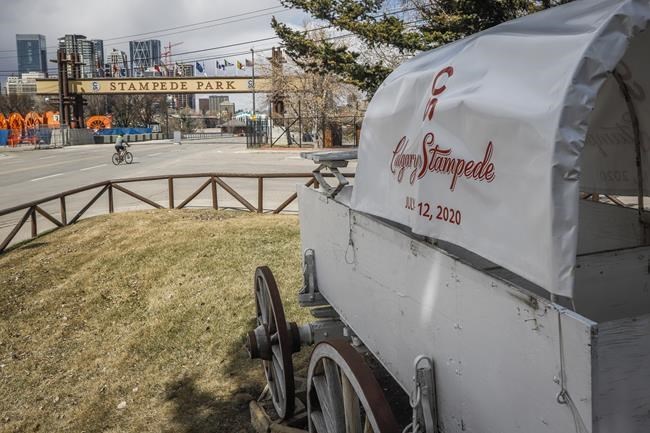CALGARY — A world-famous annual rodeo that survived the Great Depression, two world wars and a devastating flood seven years ago was felled by a microscopic virus this year and will have a different look if it's allowed to go forward in 2021.
Calgary Stampede president Dana Peers says planning is underway, with fingers crossed, to stage the celebration of cowboy life, which brings in a million visitors each year and gives the local economy a $282-million boost.
"Who would have thought it would be a pandemic that would really take us to a whole new level of challenge?" Peers said in an interview.
The Stampede first started on an annual basis in 1923. It had been held every year since, including in 2013 when Calgary and other communities in southern Alberta were devastated by flooding. The grounds were under water, but frantic efforts enabled the 10-day rodeo, fair and midway to go ahead.
"Unlike the floods, where the waters receded and they allowed us to get in there and get the physical work done and move forward, here we are 10 months later and the pandemic hasn't receded," Peers said.
"For that reason, we haven't been able to turn around like we did in 2013."
Another challenge, Peers said, is there's been little revenue, since most of the 1,200 events held at Stampede Park each year were also cancelled. A COVID-19 testing site was set up instead and the rodeo grandstand has been used as a courthouse to allow for physical distancing.
Peers said he remains "very hopeful" the Stampede will be held in some form next year. Stampede officials are working with Alberta Health Services and Calgary's Emergency Management Agency to find a way to hold it safely. He said the arrival of vaccines is also a positive.
"We need to think about new ways to be able to have people (in the) park safely, to be able to social distance, to have those kind of events where people can feel safe," Peers said.
"I see 2021 as a bridge year. We're hopefully going to ... still have a Stampede. And by the time we get to 2022, hopefully we're back to a situation where it would be more normal."
University of Calgary professor Aritha van Herk, who wrote "Stampede and the Westness of the West," said event officials showed leadership by cancelling in 2020, but people are anxious for it to return.
"You're not a Calgarian unless you've participated completely, drunk too much, danced your feet off. Every part of it is part of the city's character."
Van Herk said she expects the event will go ahead next year on a limited basis.
"I bet they will try to do it in such a way that they really limit attendance and they'll use this opportunity to rethink everything. We've been going for a 100 years. What can we make better?"
The City of Calgary had already been hit with a financial crisis linked to a drop in oil prices, which led to layoffs and extensive amounts of empty space before the pandemic began.
The president and CEO of Calgary Economic Development said the city has a perception problem, which hasn't been helped by focusing on the Stampede and energy sector while ignoring the booming tech and financial sectors.
"People think of us as only an oil and gas town ... and yet there's so much more going on and has been for the last several years," said Mary Moran.
"It doesn't mean you abandon your heritage. We have to honour that."
This report by The Canadian Press was first published Dec. 24, 2020.
— Follow @BillGraveland on Twitter
Bill Graveland, The Canadian Press



